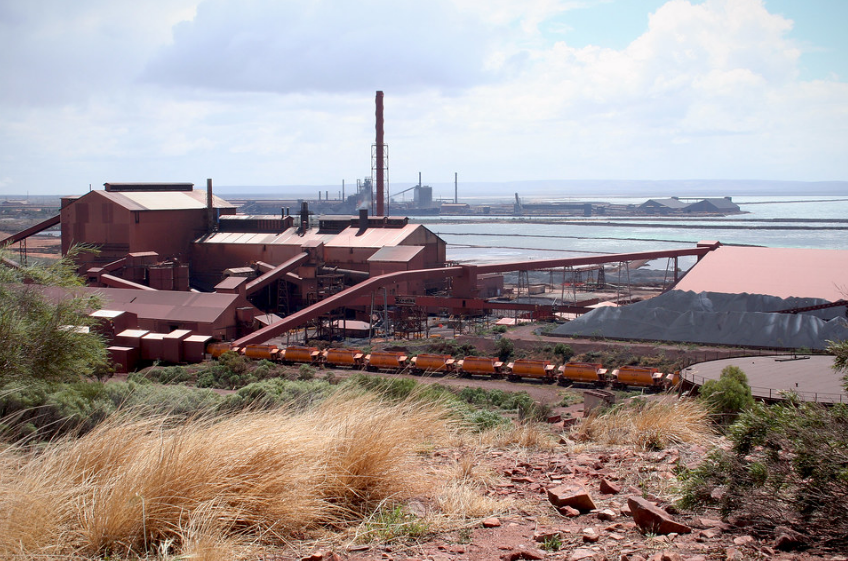Instability of Capitalist Economy Is Ever Present
Written by: Ned K. on 17 August 2024
Photo: Whyalla Steelworks by Mangrove Rat, Flickr Commons
Australia is a capitalist economy in which capitalists compete with each other for markets and market share to increase profits. Capitalists also look for ways to increase exploitation of workers to increase surplus value produced by workers. The relative strength of the capitalists and workers is uneven across different industries and within an industry.
This situation is even more precarious for workers when their employer is highly dependent on overseas markets to sell their products and realize profits,
The iron ore and steel industry is a current example of how precarious this situation can become.
At the Whyalla Steel Works, the UK based multinational owner, GFC Alliance announced the sacking of 50 workers and blamed "poor conditions in global steel markets". GFC Alliance recently closed one of its steel works in Eastern Europe. At Whyalla, subcontractors report late payments by GFC Alliance.
The main union at the Whyalla Steel Works is fearful that more sackings will come. The Mayor of Whyalla is talking up GFC Alliance's commitment to the steel plant and its plan to produce high quality "green steel".
There is some truth in GFC's statement that the conditions in global steel markets are poor.
On the following day of the announcement of the 50 sackings, the Australian Financial Review (AFR) ran an article headed "Iron Ore crash dims budget surplus hopes". Iron ore prices have dropped 30% this year which may lead readers to think that a drop in iron ore prices should be good for steel makers like GFC Alliance in Whyalla by lowering their cost of production.
However, the reason for the drop in iron ore prices according to the AFR is that the demand for iron ore to Australia's main iron ore export market has declined due to a drop in production of steel by China's massive steel works. The drop in demand for steel in China is due to the collapse of the new housing market in China.
Australia's capitalist economy in earlier times depended greatly on export of wool to the UK in particular.
Since the mid-20th Century, reliance "on the sheep's back" became "reliance on iron ore".
For the economy as a whole and the Australian Government's economic plans leading into a federal election year, what happens to the iron ore and steel industry in Australia and indeed in China may be the difference between winning and losing the election.
The AFR article argues that a $US10 a ton drop in (iron ore prices) below what has been forecast inflicts a $2.4 billion hit to revenue in 2024-25 and $4.5 billion over two years."
The chairperson of China's huge Baowu steel works in Shanghai, Hu Wangming, said the challenge for the iron ore producers could be worse than in 2008 and 2015 when iron ore prices fell below $40 a ton.
US finance capital corporation, Morgans, estimates that iron ore needs to trade at between $80 -$100 a ton for the supplier to break even.
In Australia, the iron ore "suppliers" are multinational corporations like BHP and Rio Tinto. While the iron ore industry is under their control, the job security of both iron ore and steel workers is at risk and the Australian Government budget forecasts are guess work, a wing and a prayer at best.
Workers and their families in towns like Whyalla and their surrounding iron ore mines have a long history of class struggle and they produce some of the highest steel in the world from iron ore mined in Australia.
A progressive Labor Government would nationalize the iron ore and steel industries to eliminate Australia's dependence on iron ore exports and import of inferior quality steel from places like South Korea, Japan and China.
The monopoly capitalists’ economists in Australia keep a close eye on international market trends. They advise governments on what is coming, but they never advise governments to nationalize key industries for the well-being of Australians and the country's economic stability.
That is why working people and their allies need to fight for an independent, socialist economy for Australia.
Print Version - new window Email article
-----
Go back
Independence from Imperialism
People's Rights & Liberties
Community and Environment
Marxism Today
International
Articles
| Richard “Hiroo Onada” Marles |
| Indigenous people's leading role in Northern Australia |
| Blainey's "The causes of war" - a timely read |
| Venezuela and Australia, we’ll fight for our independence and we’ll win! |
| Speech at Venezuela solidarity rally, Melbourne, January 4 |
| CPA (M-L) condemns US kidnapping of Maduro |
| Holiday Reading - "The New Cold War" |
| US imperialism: can it manage its decline to stay on top? |
| AUKUS: “Full steam ahead” to nowhere? |
| Snap SA protest targets arms manufacturers |
| Talk at Eureka Rebellion Anniversary and 50 years since Gough Whitlam's dismissal commemorative meeting |
| Book Review: Turbulence |
| Book review: Empire of AI: the reckless race for total domination |
| AUKUS prompts razor gang cuts to science and health |
| Gough Whitlam: The Vista of the New – a shoddy Murdochian attempt to deny history |
| The Whitlam Dismissal: America's coup for the control of Australia |
| CPA (M-L) report to the Second Women's Conference of ICOR |
| Grain farmers oppose sand miners |
| Oppose foreign ownership of Australia's water |
| Whose is this “national interest”? |
-----

